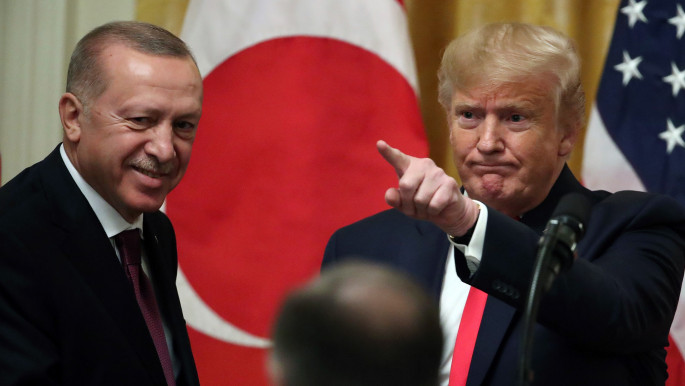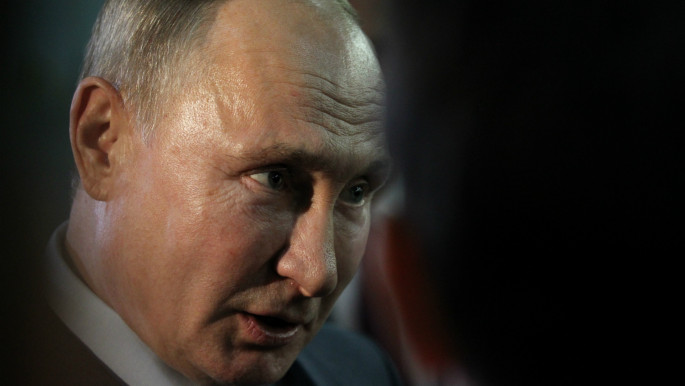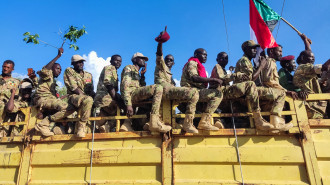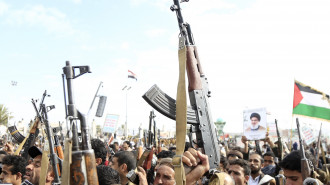Turkey, US sanctions and the looming S-400 showdown
President Recep Tayyip Erdogan had previously vowed to complete the deployment of the newly acquired Russian S-400 missile system, a move that would have potentially triggered sanctions and impetus for additional punitive legislation.
For now, the S-400 issue appears to have subsided, although US Congress remains poised to act.
The Protect Against Conflict by Turkey or, "PACT" Act, which has passed the House of Representatives and is currently before the US Senate, offers a guide to the potential trajectory of Turco-US ties.
The bill calls for multiple sanctions against Turkey, specifically targeting its military apparatus for operations carried out in northern Syria against the US backed Syrian Democratic Forces (SDF).
While the SDF is commonly lauded in Washington as the most "effective" fighting force in Syria, Ankara alleges that it is nothing more than an organ of the Kurdish PKK, which it (and the US) considers a terrorist group.
 |
Before Covid-19 swept the globe, a major crisis between the US and Turkey seemed inevitable |  |
The US meanwhile claims that the SDF is necessary to suppress the regrouping of the Islamic State (IS). It is also the last remaining equity the US still has in play in the broader Syrian civil war.
S-400 missiles
The question of Turkey's acquisition of Russian S-400 missiles is also addressed within PACT's text. The missiles have elicited great concern for the alleged breach they will cause of NATO security protocols. The bill requires sanctions on various elements of the Turkish military should they deploy the system.
Turkey views the missiles as vital for its defence. The 2016 coup attempt against Erdogan was notable for the prominent use of American weaponry, particularly F-16 fighter jets, to intimidate the population.
The S-400s provide a counter against any such future attempts. The lukewarm support Erdogan received during the failed military insurrection by NATO allies furnished additional impetus for Ankara's purchase.
Almaz Antey, the manufacturer of the S-400 system, is already sanctioned by the United States. This aligns with a broader policy of measures directed by the United States against Russian defence companies since 2014, following Moscow's annexation of Crimea.
 |
|
| Read more: How long can Turkey avoid US sanctions for its S-400 missile purchase? |
Current sanction rules lay out twelve options for punishing "significant" transactions with Russian military entities, such as Almaz Antey.
The PACT act requires five of these measures to be enacted against the Government of Turkey. Many of these would restrict Turkish access to the US financial system, and the ability to import sensitive US technologies, and goods.
An arms embargo is also contemplated under the PACT bill, on any weapon systems that could be used in northern Syria. This re-treads US policy from 1975 to 1978 when Turkey was subject to a more fulsome embargo over its intervention on behalf of Cypriot Turks.
The precedent is not encouraging, the embargo achieved little in terms of compelling Turkey to modify its position, and instead was a spur for Ankara to establish its own defence manufacturing capabilities.
Financial sanctions
Along with threatening Turkish banks that facilitate the Syrian invasion, the bill also mandates sanctions against Halkbank. Turkey's seventh largest bank is publicly owned and was the lynchpin of an elaborate sanctions "evasion" scheme that allowed Iran to collateralise its gas sales to Ankara by exchanging lira for gold, which was then liquidated into foreign exchange in Dubai.
The scheme was overseen by a dual Turkish-Iranian national, Reza Zarrab, who, after being arrested in Miami, agreed to cooperate with US authorities. The Department of Justice is currently pursuing litigation against the bank, which denies all charges. Zarrab alleged involvement of not only the Turkish state, but Erdogan's family as well.
Turkish gold interests have been of US concern in another context as well. Since targeting Venezuela's gold sector in 2018 with sanctions, the US has made pointed references to the alleged transfer of gold by Venezuela to Turkey, which plays a key facilitating role in Caracas's international bullion sales. Turkey is thought to be a key refiner and transit point for Venezuelan gold.
Targeted officials
Four senior Turkish officials have been singled out for sanctions in the bill. Among the targets is the minister of treasury and finance, who is Erdogan's son-in-law. Berat Albayrak is apparently close to US President Donald Trump's own son-in-law, Jared Kushner.
 |
The Protect Against Conflict by Turkey, or PACT Act, offers a guide to the potential trajectory of Turco-US ties |  |
This informal network of relationships as well as Trump's business interests in Istanbul have, to date, somewhat shielded Turkey, despite Congressional pressure. A Democrat Senator has even accused Trump of misusing his authority to protect Erdogan from investigation, and demanded that US Attorney General Bill Barr initiate a probe.
Previous actions
Sanctions against Turkey are not merely a theoretical possibility, a number of measures have already been enacted outside of PACT. This includes Turkey's suspension from the error plagued F-35 program. Moreover, the Executive Order that initially targeted Turkey's invasion of Syria remains in place, although no one is currently named under those authorities.
Congress meanwhile has passed a resolution condemning the Ottoman Empire for the Armenian genocide, a point that was protested by Turkish officials. The US also continues to harbour Fethullah Gulen, who is wanted in Turkey for his alleged role in the failed coup.
The US has also enacted sanctions against Russian energy projects in Turkey. Turkstream, the South Eastern twin of Russia's Nordstream gas pipelines is now in scope for sanctions. Specialist pipe laying vessels or those who assist their activities could be subject to targeting under new laws, although most of the maritime work on the line has been largely concluded already.
 |
|
| Read more: Russia aims to become a major arms trader in the Middle East again |
Turkey's options
Turkey holds many equities with which to bargain with the United States. For one, Incirlik air base, the alleged location of at least one of the US's Middle Eastern thermonuclear arsenals, is of great strategic importance to the Pentagon. Turkey could easily limit access to this vital outpost, or even expel US forces in retaliation of sanctions. This would constrain the ease with which the US operates in the region.
The Turks have also shrewdly calculated that the White House's preoccupation with its handling of the coronavirus pandemic presents an opportunity to stall Congressional action. Ankara has shipped medical aid to the US and President Erdogan has praised Trump's response to the virus.
Historically, Turkey has fielded NATO's second largest army, which was a critical pillar for deterring the Soviet Union. The Turks received military hardware and trade incentives in exchange for becoming a front-line state against communist aggression.
This ability to subsidise the security cost to Western states by volunteering to absorb Soviet attacks from the East was an attractive bargain. This model has now become unviable.
 |
Turkey has shrewdly calculated that the White House's preoccupation with its handling of the coronavirus pandemic presents an opportunity to stall Congressional action |  |
In more recent times, the threat to Turkey has not emanated from Russia, but revanchist Kurdish forces, which are now seemingly allied with the United States. No amount of military hardware will placate such fundamental security concerns.
Sanctions are unlikely to compel any meaningful change in Turkish behaviour and therefore a more realistic recalibration is warranted, one which recasts ties to better accommodate the changes in security interests between the two states.
For its part, Turkey has proposed an off-ramp to the United States by offering to convene a technical working group to satisfy US concerns with respect to the S-400 controversy. This is a long standing argument presented by the Turks, who have noted that software based workarounds would sufficiently decouple the S-400s from NATO military assets.
Given the growing instability in Syria's Idlib province, the solution offered by the Turks is worthy of serious consideration.
Owais Zaheer is a freelance data researcher who has previously written for a variety of publications including Al Jazeera, Muftah, The Friday Times and the Daily Times
Follow him on Twitter: @EastofAden





 Follow the Middle East's top stories in English at The New Arab on Google News
Follow the Middle East's top stories in English at The New Arab on Google News


